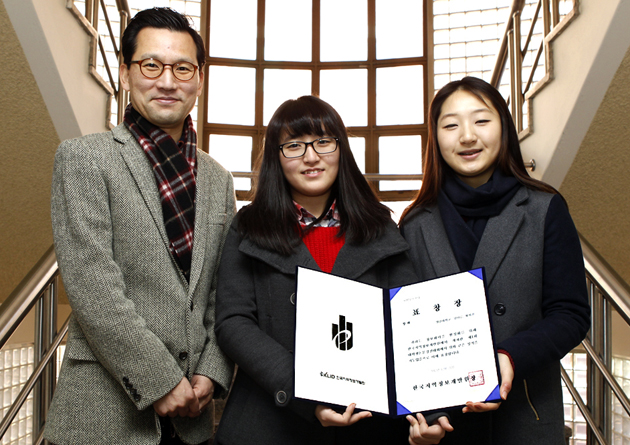Girls' Team from the Department of Public Administration wins '1st Thesis Competition For University Students' for Information Network Village
Present success strategy and plan for information network village to reduce disparity between urban and rural regions
[December 26, 2012]
 Department of Public Administration Team and guidance professor who won the '1st Thesis Competition For University Students' hosted by KLID
Department of Public Administration Team and guidance professor who won the '1st Thesis Competition For University Students' hosted by KLID
(from left to right: Professor Hwang, Sung-soo, Nam, Da-reum, Hwang, Hee-jin) "I'm so happy to be able to receive this award at a nation-wide competition with my project on 'Information Network Village' that I worked on while taking a class in the 'Study of Public Administration Information System."
Hwang, Hee-jin (22, senior) and Nam, Da-reum (21, junior) of the YU Department of Public Administration were given participation awards at the '1st Thesis Competition For University Students' held at the Korea Local Information Research and Development Institute (KLID). Because it was the first university students (graduate school students) thesis competition held for about 2 months since mid July on a relatively rare theme of 'strategy for promoting the operation of information network village', there was no top winner and only three participation prizes (YU, Dankook Univeristy and Chungnam University) were given the awards of the president of KLID and a cash prize.
Though their grades were different, Hwang and Nam, who had strong teamwork as they took the same class since the first semester, were awarded for their thesis titled 'Strategy for Second Leap of Information Network Village' (guidance professor Hwang, Sung-soo, Department of Public Administration). The research received high scores as the thesis identified the actual status by visiting and phone interviews of 6 Information Network Villages in the region, and based on this, suggested a concrete alternative.
In fact, they conducted field studies of a total of 6 Information Network Villages, including the Midae and Naedong Villages of Daegu, which they had already once visited for their class assignment during the semester. In result, in the case of Midae and Naedong Villages of Daegu that are famous for growing water parsley, sales of water parsley via e-commerce accounted for only 10% of total sales. Also, in the case of Yandong Folk Village of Gyeongju, the level of contribution of informationization to attracting visitors and sales of local specialties were found to be considerably small. Thus, they pointed out that the informationization of hardware were not directly connected to the informationization of software and the increase of income for farms, and suggested alternatives such as ▲ plans to maximize synergy effects for duplicate support ▲ operate Information Network Village together with farmers from the city ▲ establish PR strategies using SNS, and ▲ development of courses customized by theme and customer.
"While going out on the field, analyzing collected data, and theoretically organizing data, I was able to learn a lot and felt a great deal of accomplishment. I was proud of myself especially after receiving this award." They added, "We are confident that making a control tower to integrate and manage overlapping projects and by utilizing the relatively younger farmers, it will be possible to breathe life into the Information Network Village" as they expressed their hopes that their suggestions will contribute to the success of the Information Network Village projects.
Upon his students winning a nation-wide competition by upgrading their class assignment, Guidance Professor Hwang, Sung-soo (Department of Public Administration) said, "It is not easy for undergraduate students to win the award for their research thesis so I am very happy," while adding, "Since the success or failure of the Information Network Village is highly dependent upon closing the gaps between cities and rural areas, while promoting the local community, I am planning to look for ways to find better policies by thinking and working together with students of public administration in regular classes. Furthermore, I will be looking for ways to apply team projects with international students studying the Park Chung Hee School of Policy and Saemaul so that we can apply them in the third world nations as well."










